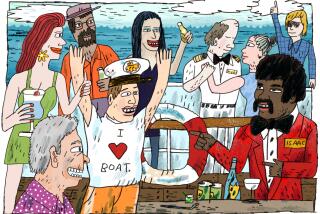Keeping Stateside Cruise Vessels Shipshape
- Share via
Before booking a cruise destined for international waters, many veteran travelers check out the vessel’s latest sanitation score. Under a long-standing voluntary program administered by the federal Centers for Disease Control and Prevention, ships are rated and the scores are disseminated by travel agents, the Internet and the CDC. Booking on a cruise ship with consistently high scores can minimize your chances of encountering contaminated food or dirty hot tubs.
But what if you are planning a cruise in domestic waters? What if you want to take a weeklong float down the Mississippi on a paddle-wheeler? Or a five-night barge trip through the Erie Canal? Or fly to Hawaii and then cruise around the islands?
The job of monitoring passenger vessels such as these does not fall to the CDC. Instead, their safety and sanitation regulation is the responsibility of the federal Food and Drug Administration, the U.S. Coast Guard and various state agencies, depending on the routes traveled.
Boats and ships that travel interstate routes are subject to sanitation regulations of the FDA, says Brad Stone, an agency spokesman. But the FDA does not use a numerical rating. The vessels pass, fail or get provisional status pending correction of problems by a deadline. If a boat fails the FDA inspection, it is taken out of service.
The FDA inspections are unannounced and are done once or twice a year at varying intervals, Stone says. They cover food, water, waste systems, swimming pools and spas on vessels. Inspectors look out for insect and rodent infestations too.
Safety on interstate vessels is regulated by the Coast Guard. For instance, vessels must have one personal flotation device, such as a life jacket, for each passenger and each crew member, says Chief Warrant Officer Jack Gaskill the U.S. Coast Guard marine safety office in Los Angeles.
Vessels also must have lifesaving apparatus, such as life rafts, and emergency signaling devices that activate if the boat begins to sink.
The Coast Guard conducts its inspections annually.
Depending on itineraries, state agencies might also get involved in sanitation and safety on boats. For instance, the Alaska Marine Highway System, which operates nine passenger vessels on routes that include stops in Washington state, is regulated not only by the Coast Guard and the FDA but also by the Alaska Department of Environmental Conservation, says Norm Edwards, operations officer for the system.
How can consumers find out if the vessel they’re planning to vacation on has met safety and sanitation requirements? Ask the booking agent, contact the operating line directly (some lines state their compliance on their Web sites) or check the CDC’s ship inspection Internet site, https://www2.cdc.gov/nceh/vsp/vspmain.asp.
Some vessels that ply interstate routes in summer also sail U.S.-foreign itineraries in winter, which makes them subject to CDC inspection.
Healthy Traveler appears on the second and fourth Sundays of the month. Kathleen Doheny can be reached at kdoheny@compuserve.com.
More to Read
Sign up for The Wild
We’ll help you find the best places to hike, bike and run, as well as the perfect silent spots for meditation and yoga.
You may occasionally receive promotional content from the Los Angeles Times.





